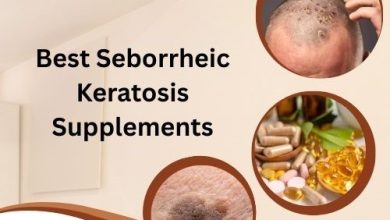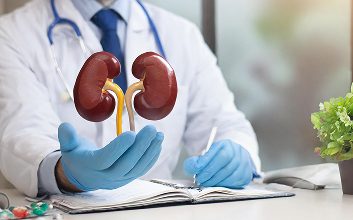Polycystic Kidney Disease: Best Supplements to Support Your Health
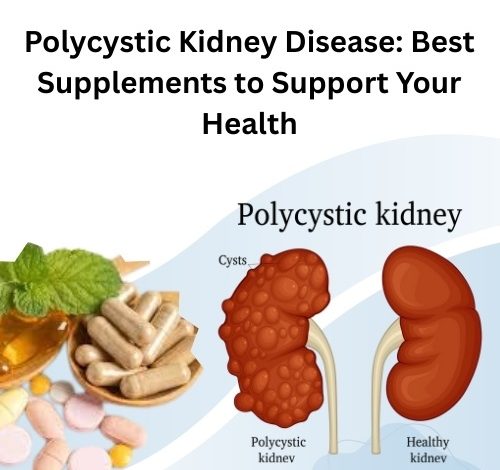
Polycystic Kidney Disease (PKD) is a complex and often hereditary condition that affects millions of people around the world. Characterized by the development of fluid-filled cysts in the kidneys, PKD can progressively impair kidney function, potentially leading to kidney failure. Although there is no known cure for PKD, emerging research shows that certain supplements and lifestyle changes can play a powerful role in managing symptoms, supporting kidney health, and improving quality of life.
The best supplements to support your health if you are living with Polycystic Kidney Disease. You’ll also learn how they work, how to use them safely, and what to discuss with your healthcare provider before beginning any new supplement regimen.
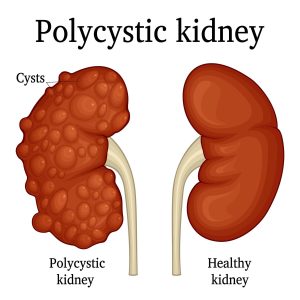
Understanding Polycystic Kidney Disease
Polycystic Kidney Disease is a genetic disorder that causes multiple cysts to grow on the kidneys. These cysts can become quite large, leading to swollen kidneys and damaged kidney tissue. There are two main forms of PKD:
- Autosomal Dominant Polycystic Kidney Disease (ADPKD) – the most common type, usually diagnosed in adulthood.
- Autosomal Recessive Polycystic Kidney Disease (ARPKD) – rarer and typically diagnosed in infancy or early childhood.
Common Symptoms of Polycystic Kidney Disease Include:
- High blood pressure
- Pain or heaviness in the back or sides
- Frequent urinary tract infections (UTIs)
- Blood in urine (hematuria)
- Kidney stones
- Enlarged abdomen
- Kidney failure in severe cases
While medical interventions, such as blood pressure control and dialysis, are often necessary, dietary and supplemental support can significantly improve kidney health and slow disease progression.
Related Article: Polycystic Kidney Disease Symptoms, Causes, Diagnosis and Treatment
Why Supplements Matter for Polycystic Kidney Disease
Best Supplements for Polycystic Kidney Disease can help address nutritional deficiencies, reduce inflammation, support kidney filtration, and improve cellular function. Since PKD affects how the kidneys process waste, it’s vital to support these organs in any way possible without overburdening them.
Below are some of the best supplements that may benefit people with Polycystic Kidney Disease, based on available evidence and clinical insight.
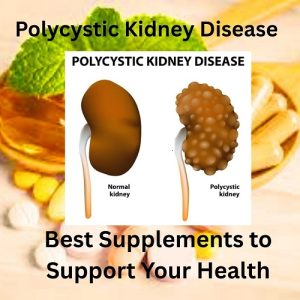
10 Best Supplements for Polycystic Kidney Disease
Below are 10 best supplements that may benefit people with Polycystic Kidney Disease, based on available evidence and clinical insight.
1. Omega-3 Fatty Acids (Fish Oil)
Benefit: Anti-inflammatory & Heart Health Support
Omega-3 fatty acids, primarily found in fish oil, are essential for reducing inflammation throughout the body. Chronic inflammation is a common driver of disease progression in PKD.
Related Article: Polcical for Kidney Restore Kidney Cleanse Herbal Supplement Reviews
Why It’s Good for PKD:
- Lowers blood pressure (a major complication in PKD)
- Reduces the risk of cardiovascular issues
- Supports healthy kidney function by minimizing inflammatory damage
Recommended Dosage: 1000–2000 mg daily (EPA + DHA combined), unless otherwise advised by your physician.
Caution: Choose molecularly distilled products to avoid heavy metal contamination.
2. Coenzyme Q10 (CoQ10)
Benefit: Cellular Energy Production & Antioxidant Support
CoQ10 is a naturally occurring antioxidant that plays a crucial role in mitochondrial function. People with PKD often experience fatigue due to declining kidney function, and CoQ10 can help combat this.
Why It’s Good for PKD:
- Enhances energy production at the cellular level
- Protects kidneys from oxidative stress
- May help reduce cyst growth, based on animal studies
Recommended Dosage: 100–300 mg daily with food
Caution: Can interact with blood pressure and blood-thinning medications.
3. N-Acetyl Cysteine (NAC)
Benefit: Detoxification & Antioxidant Boost
NAC is a precursor to glutathione, one of the body’s most powerful antioxidants. It supports liver detoxification, reduces oxidative damage, and has shown promise in kidney support.
Related Article: Top 7 Diet Tips for Polycystic Kidney Disease
Why It’s Good for PKD:
- Enhances glutathione levels to protect kidney tissue
- Reduces oxidative stress and inflammation
- May help prevent further kidney damage
Recommended Dosage: 600–1200 mg daily
Caution: Consult your doctor if you have asthma or take medications that affect the liver.
4. Curcumin (from Turmeric)
Benefit: Natural Anti-inflammatory Agent
Curcumin, the active compound in turmeric, is widely recognized for its anti-inflammatory and antioxidant properties.
Why It’s Good for PKD:
- May help reduce cyst growth through anti-inflammatory pathways
- Protects against fibrosis (scarring) in the kidneys
- Supports immune balance
Recommended Dosage: 500–2000 mg of curcumin extract per day with black pepper extract for better absorption
Caution: Avoid if you have gallbladder issues or take blood thinners.
5. Magnesium
Benefit: Blood Pressure & Muscle Function Regulation
Many individuals with kidney issues are magnesium deficient, and this mineral is vital for over 300 biochemical reactions in the body.
Related Article: A Promising Treatment for Polycystic Kidney Disease Naturally
Why It’s Good for PKD:
- Helps control high blood pressure
- May reduce kidney stone formation
- Supports cardiovascular health
Recommended Dosage: 200–400 mg daily (magnesium glycinate or citrate is preferred)
Caution: Too much magnesium may cause diarrhea or interact with kidney medications.
6. Vitamin D3
Benefit: Bone Health & Immune Modulation
People with chronic kidney disease, including PKD, often have low levels of vitamin D, which can affect bone density and immune health.
Why It’s Good for PKD:
- Regulates calcium and phosphorus metabolism
- Reduces inflammation
- May slow progression of kidney damage
Recommended Dosage: 1000–4000 IU daily, based on blood levels
Caution: Get your levels tested before supplementation to avoid toxicity.
7. Probiotics
Benefit: Gut Health & Toxin Elimination
A healthy gut is crucial for those with compromised kidney function. The buildup of uremic toxins in the gut can worsen symptoms in PKD.
Why It’s Good for PKD:
- Supports digestion and nutrient absorption
- Helps break down and eliminate uremic toxins
- Strengthens immune defenses
Recommended Dosage: 5–15 billion CFUs daily, from multi-strain probiotics
Caution: Look for kidney-friendly strains like Lactobacillus acidophilus and Bifidobacterium bifidum.
8. Alpha-Lipoic Acid (ALA)
Benefit: Antioxidant Support & Glucose Regulation
ALA is both water- and fat-soluble, meaning it can neutralize free radicals in all parts of the cell.
Why It’s Good for PKD:
- Enhances insulin sensitivity
- Reduces oxidative stress in kidney tissues
- May protect against diabetic complications (common in PKD patients)
Recommended Dosage: 300–600 mg daily
Caution: Monitor blood sugar if you have diabetes or hypoglycemia.
9. Herbal Supplements: Astragalus & Rehmannia
Benefit: Traditional Kidney Support
Used in Traditional Chinese Medicine, herbs like Astragalus and Rehmannia have shown kidney-protective effects.
Related Article: What is the Diet for Polycystic Kidney Disease?
Why It’s Good for PKD:
- May reduce proteinuria (protein in urine)
- Helps maintain normal blood pressure and kidney filtration
- Offers adaptogenic support to the adrenal glands
Recommended Dosage: As directed on standardized herbal extract labels
Caution: Always consult a healthcare provider before using herbal medicines, especially with other medications.
10. B-Complex Vitamins
Benefit: Energy Metabolism & Nervous System Support
B-vitamins are water-soluble and often lost through urine, especially in people with kidney issues.
Why It’s Good for PKD:
- Supports nerve health
- Enhances energy metabolism
- Helps control homocysteine levels (important for heart health)
Recommended Dosage: Follow label instructions or as advised by a nutritionist
Caution: Avoid high doses of B6 for long periods—it may cause nerve issues in excess.
Important Tips Before Taking Supplements for Polycystic Kidney Disease
While these supplements offer great promise, it’s vital to approach supplementation with care:
- Always consult your nephrologist or healthcare provider.
- Avoid supplements that stress the kidneys (e.g., high doses of potassium or phosphorus).
- Choose high-quality brands that undergo third-party testing.
- Monitor your labs regularly to ensure safety and efficacy.
- Start slowly and only introduce one supplement at a time.
Other Lifestyle Strategies to Support PKD
Supplements are just one part of a comprehensive approach to managing Polycystic Kidney Disease. Here are other essential steps:
- Stay well hydrated, unless advised otherwise by your doctor
- Limit sodium and processed foods
- Adopt a plant-rich, kidney-friendly diet
- Maintain a healthy weight
- Get regular moderate exercise
- Control blood pressure and blood sugar
Conclusion: Empowering Your PKD Journey
Living with Polycystic Kidney Disease can be challenging, but you don’t have to feel powerless. With the right combination of medical care, lifestyle adjustments, and evidence-based supplements, you can support your kidney function and improve your overall well-being.
Each supplement discussed in this article offers unique benefits—from reducing inflammation to protecting your kidneys from further damage. As with any chronic condition, a personalized approach under medical supervision is key. By staying informed and proactive, you can take meaningful steps toward living a healthier, more empowered life with PKD.

